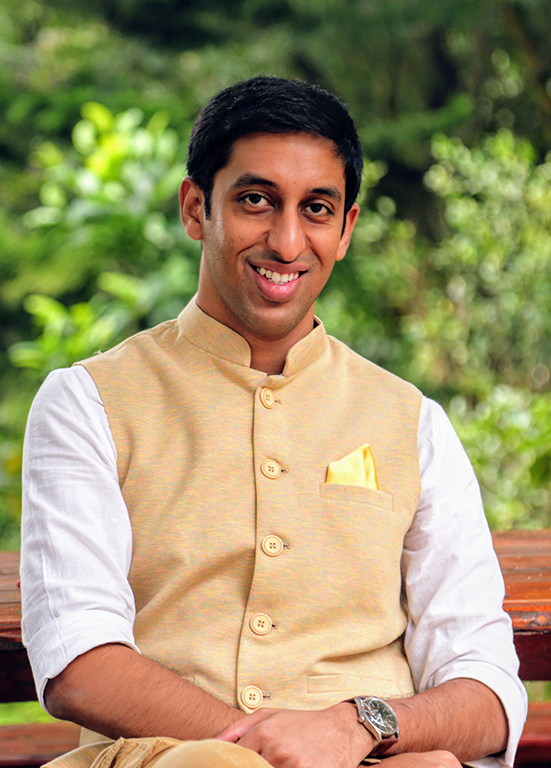
Education must never be a dirty word
Despite the abundance of benefits it could bring to wider society, prisoner education still remains a taboo subject, says James Tweed, the founder of digital learning company, Coracle


Startups should be looking to solve genuine problems in society, say brothers and Co-Founders of The Startupreneur, Aakarsh Naidu and Adhikar Naidu.
The organisation works with entrepreneurs and incubators with the goal, as Aakarsh explains, of ‘training them and helping bridge the gap between intent and impact’.
The Naidu brothers both pursued master’s degrees abroad, at the London School of Economics (LSE), but always with the intention of taking their experience and skills back to India. ‘We wanted a global exposure and to come back to India and create an impact,’ Aakarsh says.
This impact includes trying to raise awareness of the organisation’s work among new audiences, through a hip-hop music video available on YouTube. ‘It was about reaching out to new demographics in a new format and a new language,’ Aakarsh explains. Read the full interview below to learn more.
Why did you both choose to study in the UK, and why management at LSE?

Aakarsh Naidu: Our father has been an entrepreneur for more than 30 years, establishing and running some of the biggest companies in India’s green energy sector, so both of us have always had an interest in pursuing business studies.
Having studied business management at undergraduate level, I wanted to specialise in human resource management at a premier institution that offered global exposure, and LSE’s MSc in Human Resources Management was a top-ranked programme. My brother, Adhikar, pursued LSE’s Master’s in Management and Digital Innovation. He was a finance graduate and was working in the investments division of Goldman Sachs, before he discovered his interest in emerging technologies.
LSE’s Department of Management was the perfect platform for both of us to explore and specialise in our areas of interest. The exposure and the global network for a student at LSE is also one of a kind.
Adhikar Naidu: I used to visit my elder brother, Aakarsh, in London, during his time at LSE. I was always enamoured by the legacy of this great institution and the diversity it brings. My brother used to have friends from different parts of the world, who would ask me if I would join the School one day. I used to say, ‘I will one day’ – without realising that I would actually do it!
What were the highlights of the programmes you studied?
Aakarsh: The top highlights for us were getting a unique global exposure and a cultural immersion with access to some of the most talented brains in the world alongside friendships that can span across continents and memories which will last a lifetime.
For me, the HR management programme I took was interdisciplinary in the sense that it gave me the opportunity to study subjects on management, economics and international relations at the same time. I particularly enjoyed the course on ‘Negotiation Analysis’, which was experiential and gave me the opportunity to work with peers across the globe, helping me understand the business and cultural nuances.

Adhikar: I had the opportunity to study concepts in emerging technologies like AI, augmented reality (AR) and VR, the Internet of Things (IoT), and blockchain to name a few. I also received a distinction for my thesis on the VRIO (value, rarity, imitability and organisation) framework for startups in business incubators. The programme and experience as a whole helped cultivate the spark to create an impact through entrepreneurship.
Was returning to India after completing your studies always the plan? Please explain your answer.
Aakarsh: Our reason for studying in the UK was very clear right from the start. We wanted a global exposure and to come back to India and create an impact. We wanted to create an impact in our own country while also being global citizens.
True to this goal, I’ve worked with some top startup incubators and educational institutions, such as, IIM Bangalore and the Indian School of Business. Meanwhile, Adhikar has worked with organisations like Goldman Sachs and the angel investor network, Keiretsu Forum.
Having specialised in our respective fields, we are now pooling our strengths and understanding through our own venture, The Startupreneur, through which we are building a platform to nurture entrepreneurship and innovation not only in India, but also across the world.
You’ve talked about the ‘triple bottom line’ in previous interviews. What does this term mean to you and how does this align with your organisation’s ambitions?
Aakarsh: ‘People’, ‘planet’ and ‘profit’ – these were the magical words that we learnt at LSE while studying the concept of the triple bottom line (TBL). For centuries, the term ‘bottom line’ has been synonymous with money, profit and other monetary markers such as return on investment, shareholder value and cash flow. The TBL approach adds a new meaning to this word by using the combined power of people, planet and profit to measure the health and quality of a business’ impact.
The difference between ordinary and extraordinary is that little ‘extra’ that can make you stand out as an entrepreneur among the crowd. It can take the form of social impact, issues you take up, or an organisation’s ethics and values. The organisational value for us at The Startupreneur is simple: ‘Startups shouldn’t just be about making millions but also helping millions by solving a genuine problem.’ We want to help startups develop sustainable business models that have a social impact.
What would you say is the biggest challenge facing startups and entrepreneurs in India?
Aakarsh: The biggest challenge for startups and entrepreneurs, according to us, is in moving from ‘zero to one’ [the name of Peter Thiel’s 2014 book that stems from Thiel’s teaching on startups at Stanford] and understanding the concept of product/market fit.
This is a mindset problem and requires first-time entrepreneurs to experience the process of starting up before actually starting up. This experience clears a lot of myths around business models, hiring and funding, all of which are necessary for building a successful startup. This is where Startupreneur directly works with entrepreneurs and incubators in training them and helping bridge the gap between intent and impact.
Can you tell us a bit about the startup you are most proud of being able to help get off the ground?
Aakarsh: Singling out one particular startup would be difficult as there have been quite a few startups that have excited us, and we’ve been committed to nurturing and helping them get off the ground.
A few such startups have been an AR/VR startup looking to make curricula and content more accessible to students, a startup which is developing a pollution-control device, and an app which identifies the quickest routes for ambulances to take to hospitals.
We’ve seen Aakarsh’s Startup Song video. What were the reasons behind taking up the mic in support of The Startupreneur’s goals?
Aakarsh: The reasons for coming up with the Startup Song are quite simple; it was about reaching out to new demographics in a new format and a new language (vernacular content). We wanted to create awareness about ‘startupreneurship’ and democratise the concept of ‘starting up’ to different parts of the country.
To our surprise, it achieved what its goal – the average age group of people watching earlier videos from The Startupreneur was about 25-35. However, viewership for the Startup Song was primarily in the age range of 18-25 and was spread more widely across India, thereby reaching new demographics. The best compliment we have received was a startup founder mentioning that her three-year-old was also singing ‘startup, startup, startup’ after listening to the song. That was heartening to hear!
Aakarsh Naidu is an alumnus of the London School of Economics (LSE), Startup Ecosystem Enabler, and is Co-Founder and CEO of The Startupreneur. He has led initiatives at IIM Bangalore’s startup incubator (NSRCEL) and is a mentor at the Founder Institute, World Resources Institute (WRI), and Catalyst for Women Entrepreneurship (CWE).
Adhikar Naidu is Co-Founder and COO at The Startupreneur. He previously worked at Goldman Sachs in India and the US, and has been a speaker at national and international events, such as Google for Startups and Esprit Entrepreneurs. He holds a master’s degree in management and digital innovation from the London School of Economics (LSE).

Despite the abundance of benefits it could bring to wider society, prisoner education still remains a taboo subject, says James Tweed, the founder of digital learning company, Coracle

Is being a startup executive really that different from being a manager or director? Yes, but probably not in the ways you think, says the author of ‘Lead Upwards’, Sarah Brown

Legal structure, documentation and intellectual property. Solicitor and ‘entrepreneur in residence’, Michael Buckworth, looks at three areas that all startup founders need to get right
For questions about editorial opportunities, please contact:

